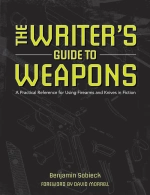
Once an error is out there, it’s out there. Sure, an e-book can be corrected on the fly, but what if it’s been months or years since the mistake was made? (Image by T A via sxc.hu)
The Good News
On the plus side, writers make weapons mistakes all the time and, thankfully, are not tossed into prison for it (yet). This is the surprising benefit of a pop culture saturated in bad information. Readers may forgive you for biffing, so long as you biff in accordance with the rest of the biffers. (Look, mom, I used biff three times in a sentence!)
The Bad News
But biffing by default is not the point. You want (or should want) to stand out from everyone else by getting these weapons details correct.
You might’ve made a big stink about your research leading up to the release of the book, only to throw readers a wrench in the hype machine with the depiction of a safety on a Glock. Or you could be letting yourself down after putting in the hours to get these details right.
Do You, Mr. Expert, Make Mistakes?
You’re damn right. I did and do make mistakes. There are even a few in The Writer’s Guide to Weapons: A Practical Reference for Using Firearms and Knives in Fiction. I won’t reveal where, but after three years of work, I still found some (shhh…don’t tell my publisher). It’s too late to go back and fix them, though. Fortunately, they’d take an exceptionally astute reader to notice.
This speaks to my golden rule about not cutting down other writers for their weapons mistakes. It does no good to chew someone out after the fact, and I’m not exactly Mr. Sinfree Stonecaster the First.
What to Do Next
Regardless of the type of mistake or when it was made, there are a few things to keep in mind.
If you can, correct the mistake, but don’t beat yourself up about it.
Don’t point out the fact that you made a mistake if no one else has noticed it. This type of self-depreciation is useful in humor, but not in maintaining your air of writerly authority. You think you’re saving face by staying one step ahead of criticism. You’re not.
However, if the mistake is blatantly obvious or noted by others, consider putting the word out as a way to let readers know you give a damn and to inform other writers.
If others call you out on the mistake, let them know you appreciate the heads up. We’re dealing in the realm of objective information here. There’s no need to take it personally. Learn from the mistake, embrace the criticism and appreciate the fact someone out there cares about your work.
By not being a jerk about it (see above point) and maintaining your dignity, you’ll prevent legitimate criticism from escalating into outright trolling. You’ll retain more readers by admitting to what happened than by getting defensive, and trolls won’t want to pick on someone who doesn’t get riled up. Usually. Some people can’t be helped.
Above all, keep a good sense of humor about yourself and your mistakes. We’re only human beings, and this is only a work of fiction. You know what a mistake really looks like? It looks like blowing a $125 million Mars probe because you forgot to convert for the Metric system.
Get the Book
 The Writer’s Guide to Weapons: A Practical Reference for Using Firearms and Knives in Fiction (Writer’s Digest Books) distills complex weapons topics into easy-to-understand concepts for fiction writers. Pick up a print or digital copy from these fine retailers:
The Writer’s Guide to Weapons: A Practical Reference for Using Firearms and Knives in Fiction (Writer’s Digest Books) distills complex weapons topics into easy-to-understand concepts for fiction writers. Pick up a print or digital copy from these fine retailers:
I had this happen on one of my books and I tend to agree with you in principle–if a reader contacts me with a mistake they found, I’m immensely grateful and will thank them profusely. But. A reader alerted me to a review another reader had left on a retail site, calling me out on a couple of points which I was actually grateful for–somehow, I’d uploaded a next-to-last draft with said mistakes and I was pretty close to horrified that I’d let it happen. I have a firm policy that I don’t respond to reviewers on the various retail sites as reviews are people’s opinions and I believe the author has no business intruding by joining that conversation. Reviews are meant for other readers and I respect that. As soon as I found out, I immediately corrected the print and electronic copies. Of course, I’d have preferred that the reader contacted me privately with their concerns so that I could thank them, but that didn’t happen. In hindsight, maybe I should have responded–it’s just not something I usually do.
LikeLiked by 1 person
That’s a great example of why it’s hard to put a rule on any of this, because that would’ve been an exception. Maybe the tone of the exchange is the litmus. So long as everyone is respectful, it’s all good. What bugs me is this idea that it’s OK to rip someone to shreds on the Internet. Calm down, people, we’re only human.
LikeLiked by 1 person